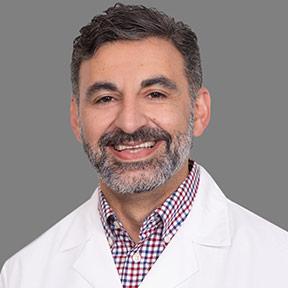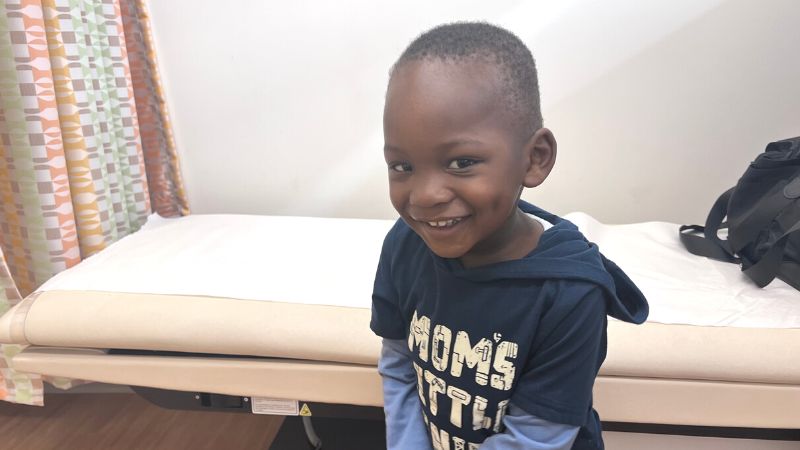What is Congenital Heart Disease?
Deborah Howell (Host): Congenital heart disease is one of the most common birth defects in the US, but can be overlooked due to symptoms not being too serious or not appearing until children grow older. To help parents identify if their child has congenital heart disease, today we'll talk with an expert about what causes congenital heart disease, it's signs and symptoms, and what to do when children start showing symptoms. I'm Deborah Howell, and our guest is Dr. Baba Rahimi, a Board Certified physician who specializes in Pediatric Cardiology. He's currently a Cardiologist at Children's Heart Institute at Memorial Care, Miller Children's and Women's Hospital Long Beach. Welcome, Dr. Rahimi.
Babak Rahimi, MD (Guest): Thank you for having me on.
Host: A true pleasure. Let's dive right in. What is congenital heart disease?
Dr. Rahimi: First I wanted to clarify, there's two terms that you use interchangeably. One is congenital heart disease and congenital heart defect. And both, mean exactly the same thing. Basically congenital heart disease is an abnormal formation of the heart structure usually early in the gestational age in the fetus. There's a whole entire spectrum of congenital heart disease.
There's very mild form or, more severe forms. The more severe form, which we refer to as critical congenital heart disease, are babies who are born with significant structural abnormalities that require surgery within the first, uh, weeks to months of life. And the more mild forms, can present much later in.
Host: Okay. And do we know what causes congenital heart?
Dr. Rahimi: We don't know exactly. We know it's multifactorial. We know that definitely there is genetic basis to it, because some babies born with a genetic syndromes are, much higher risk of developing congenital heart disease. Also, we know that the babies who are born to parents with siblings with congenital heart disease at a little bit higher risk of having a congenital heart disease.
So there's definitely some genetic basis to it, although we don't completely understand, that at this point. Maternal medical conditions can also be associated with congenital heart disease. For example, maternal gestational diabetes or maternal diabetes in general, especially if it's not well controlled. We know, mothers with diabetes have a higher risk of having infants with congenital heart disease. Other environmental factors also can play a role, such as drug abuse or alcohol abuse, by mother. And also, some, medications that mother might be taking during pregnancy.
And also, some viral infections or other infections, that other medical complications that mom can develop, during pregnancy can increase the risk of congenital heart disease. So again, we don't know exactly what causes congenital disease is probably, multifactorial, with some genetic basis and other factors involved.
Host: Fair enough. When do symptoms of congenital heart disease usually.
Dr. Rahimi: It usually depends on the severity of the congenital heart disease. In a more critical form of congenital heart disease, symptoms present soon after birth. And those are the infants that will require intervention or surgery early on. During infancy, this more milder formal congenital heart disease, such as, for example, bicuspid aortic valve, patients might not have any symptoms till they're much older, in their forties and fifties. And there are certain congenital heart disease that, patients will never have any significant symptoms.
Host: Incredible. What are the signs and symptoms of congenital heart disease parents should look.
Dr. Rahimi: That also really depends on the type and severity of congenital heart disease. As you mentioned, in the more severe cases, the infant presents soon after birth. In general, in infants, cyanosis or turning blue, increased breathing difficulty, poor eating, poor weight gain store. can be associated with congenital heart disease. In older children, is exercise intolerance, chest pain, especially with activity. Any palpitations, or, syncope, especially again with activity disorder. Red flags for us, to look for congenital heart disease.
Host: And just for those who don't know, syncope is basically fainting. Correct?
Dr. Rahimi: Yes. Fainting or passing out.
Host: Okay. What should I do if my child starts to show symptoms?
Dr. Rahimi: I think the most important thing, is to, follow with your pediatrician first, because there are other medical conditions that can have similar symptoms as congenital heart disease. And your primary care physician, should be able to help you navigate, between those and direct your child for the testing or to, specialist that can take care of that.
After following up with the your pediatrician, if it's necessary, your pediatrician or primary care doctors can refer, your child to a pediatric cardiologist for further evaluation.
Host: Sounds good. How do physicians test for congenital heart disease?
Dr. Rahimi: Well, as everything else, history and physical exams is the most important. So, having a very good history and, sometimes when I ask the parents to kind of write down exactly what symptoms the children have, it's always very, helpful, in making those diagnosis. Some other testing that can be done by your primary care doctor or your pediatric cardiologist.
It can be Hs x-ray. Basically looking at the heart and lung, pathology. Also an electrocardiogram, which looks like a heart rhythms and now electrical activity of the heart. Ultrasound or echocardiogram, is also a gold standard, in diagnosing congenital heart disease. By ultrasound or echocardiogram, of the heart, we are able to see, majority of the heart structure and function and diagnose majority of congenital heart disease, more advanced testing sometimes it's needed, such as, CT, MRI of the chest or cardiac catheterization, if needed. So, one thing that I do like to mention, one of the biggest, fields and most growing fields in pediatric cardiology is actually a fetal echocardiogram. So that's doing an ultrasound of the heart in the fetuses. I believe it's one of the best, advances in the field of pediatric cardiology.
Past, few years. By doing a fetal echocardiogram, uh, or ultrasound of the heart of the fetus, usually done after 20 weeks of gestation, we're able to diagnose most majority of this a more severe form of, congenital heart disease. So it's really important, for mom, to have a good prenatal care and prenatal follow up, and usually the obstetricians, do the primary ultrasound, looking at different structures, in the fetus.
And then if there's any concern about structure. I'm not in the heart, or mom has a high, risk to have a feed, child within, congenital heart disease. Then they can refer them to the pediatric cardiologist, to have the fetal echocardiogram done.
Host: Okay. Got it. How is congenital heart disease?
Dr. Rahimi: Again, that really depends on the severity of the heart disease. In a more, critical form or more severe form, cardiac intervention or cardiac surgery is needed, for the child, to be able to survive. In more milder form, sometimes, there might not be any requirement for intervention. It could be just a follow up with a pediatric cardiologist, for example. With a small holes in the heart, a lot of times these small holes in the heart, do not cause significant clinical symptoms, and, we as a pediatric cardiologists follow them. And in some cases, these small holes can close on their own.
So really depends, on the severity of the heart disease that your child might have.
Host: Okay. And what can parents do to help their child manage congenital heart?
Dr. Rahimi: I think the most important thing is for parents to educate themselves about their child's heart disease, ask questions and fully understand the type of heart disease that their child has, the procedures, the testing that they're done, any medication they need to, for the child to have.
And what are the treatment options. So as a pediatric cardiologist, we always encourage, parents to ask questions, and about their child, uh, condition. We always have to think about it as a teamwork, working as a pediatric cardiologist, working with a child, and also, parents, also other important things and making sure that your child has the regular follow up with their primary care doctor and their pediatric cardiologist.
And if your child is on any medication, to, to make sure, they know about the use of the medication. Why is it used and the side effects of the medication, and making sure that the child is taking this medication on a regular basis. We also really encourage to take care of themselves as well.
I know the child is the most important thing, but, you know, the parents, need to also, take care of themselves and the other children, in the household as well.
Host: When you said that, I was visualizing being on an airplane and they're telling you to put your mask on before your child, but it's
Dr. Rahimi: Exactly, Exactly, same thing. Yes.
Host: This is such great information, Dr. Rahimi. Where can parents go to learn more about congenital heart disease?
Dr. Rahimi: There is a website at mills children's, dot org, heart, that, talks about, a lot of different, more common congenital heart disease. We do encourage parents, again to learn more about their patients to heart disease, but one thing we always ask them to do is that if they go on an internet, just make sure they go to credible sites because there are a lot of information on internet, which is not accurate, and also that might not apply to their child. So, other than, middle children, dot org, slash heart, American Heart Association, or American Academy of Cardiology, would be good sources to begin, researching about those.
Host: I'm gonna repeat it one more time. Millerchildren's.org/heart. Is there anything else you'd like to add to our conversation today?
Dr. Rahimi: No, thank you. I appreciate this opportunity to be able to reach out to the parents and we are always available if there's any concern, about their child. We're always more than happy to see them and take care of them.
Host: Well, thank you so much Dr. Rahimi, for your time and expertise. Wonderful having you on today.
Dr. Rahimi: Thank you so much.
Host: For more information or to listen to a podcast of this show, please visit memorialcare.org. That's memorialcare.org. That's all for this time. I'm Deborah Howell. Have yourself a terrific day.
Congenital Heart Disease is one of the most common birth defects in the United States and can be overlooked due to symptoms not being too serious or not appearing until children grow older. To help parents identify if their child has congenital heart disease, Dr. Rahimi explains what causes congenital heart disease, its signs and symptoms, and what to do when children start showing symptoms.
Listen to the podcast featuring Dr. M. Babak Rahimi above.
Featured Speaker:
M. Babak Rahimi, M.D., pediatric cardiology, Children's Heart Institute, MemorialCare Miller Children’s & Women’s Hospital Long Beach
Related Topics
Related Providers





